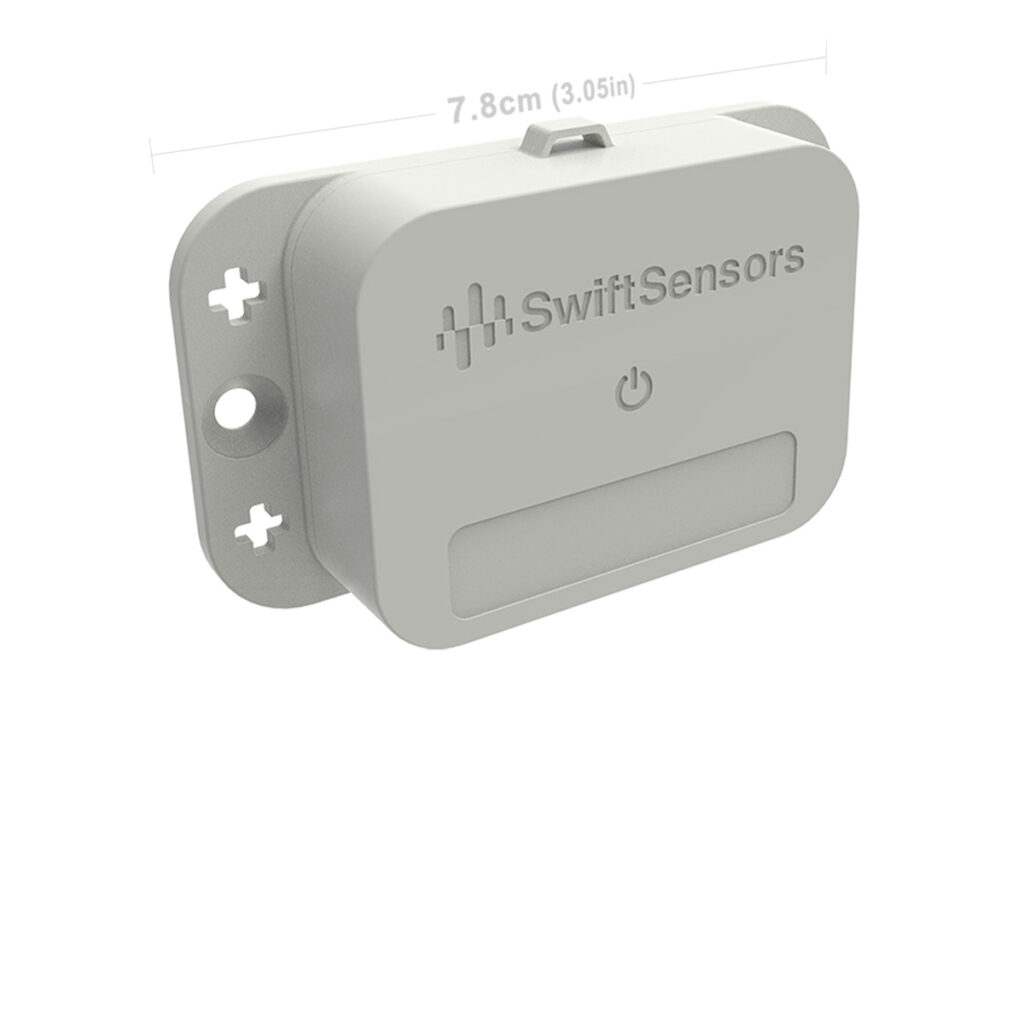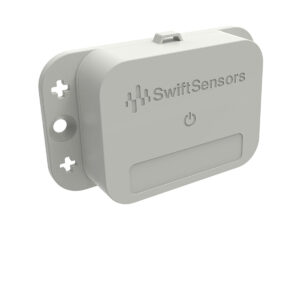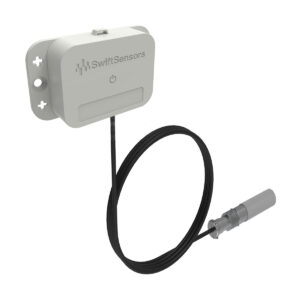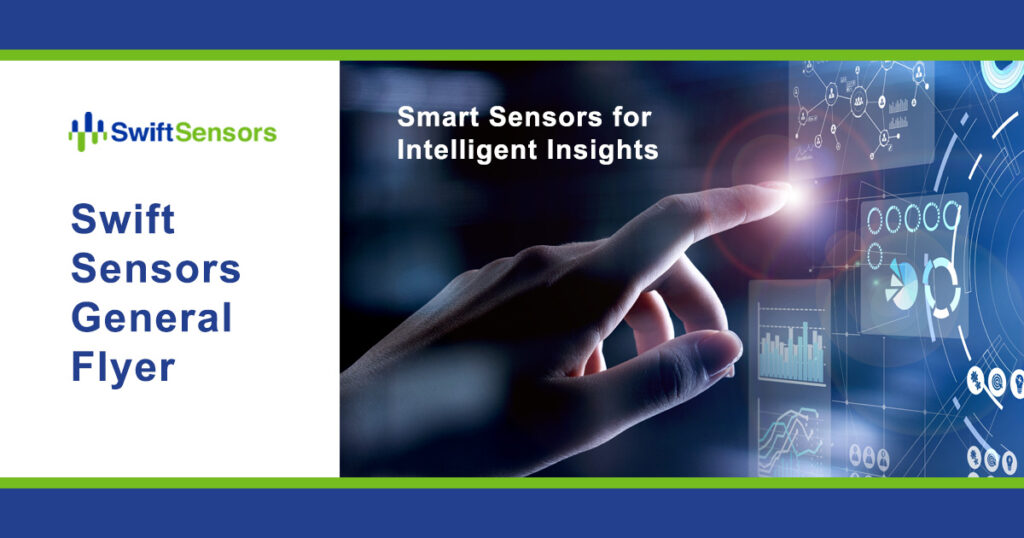Wireless Humidity Sensors
Ensure Environmental Control with Remote Humidity Monitoring
Wireless Humidity Sensors are critical for maintaining safety, product integrity, and operational efficiency across a wide range of industries. Swift Sensors advanced wireless humidity sensors deliver real-time monitoring and instant alerts, enabling you to preserve optimal environmental conditions in settings such as restaurants, medical laboratories, hospitals, and manufacturing facilities.
By leveraging our humidity monitoring solutions, you can prevent mold growth, protect sensitive equipment, and ensure compliance with stringent industry regulations.
The Best Wireless Humidity Sensors
Our most popular wireless humidity sensors combine accuracy, durability, and long battery life, making them the go-to choice for businesses across industries. Trusted in food processing, healthcare, and industrial applications, Swift Sensors delivers reliable monitoring and reporting services that meet a variety of health, safety and quality regulations.
Swift Sensors Wireless Humidity Sensors
Swift Sensors wireless humidity sensors feature:
- No wiring required
- Smaller than a credit card
- Push-button connectivity
- 6-8 year battery life
- Secure Bluetooth 5 (BLE5) communication
- IP66 Rating (dust proof and water resistant)
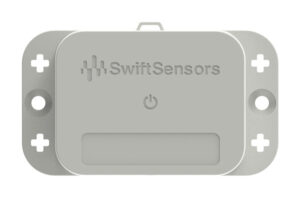
NIST Calibration Services
Swift Sensors offers NIST Calibration services through an independent ANAB ISO 17025: 2017 accredited laboratory. Swift Sensors manages all calibration logistics prior to initial sensor delivery and ensures seamless annual calibration renewal.
Swift Sensors Wireless System Overview
- Easy-To-Deploy Wireless Sensors
- Instant Critical Mobile Alerts
- Enterprise Cloud Monitoring Software
- Low-Cost Straightforward Monitoring Plan
- Robust Analytics and Compliance Reports
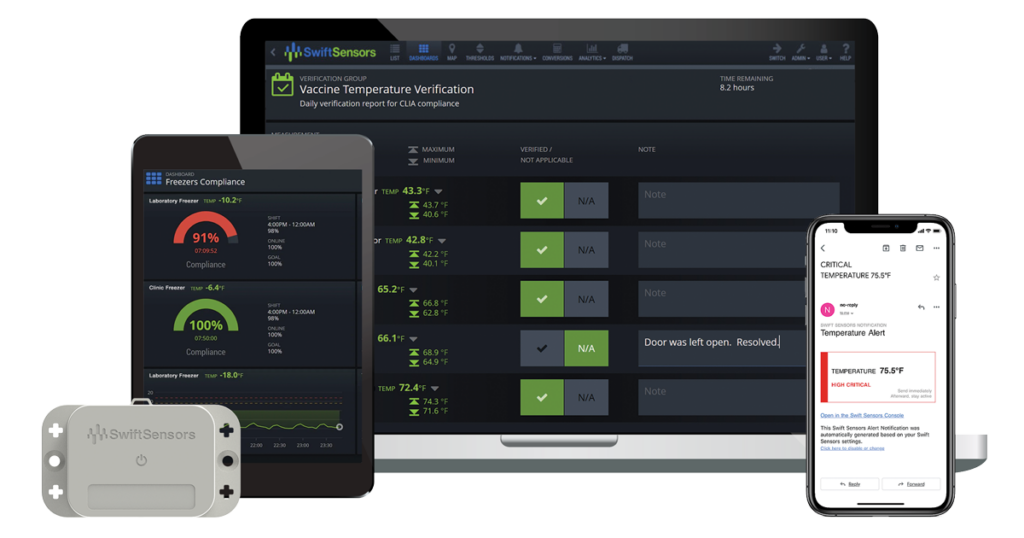
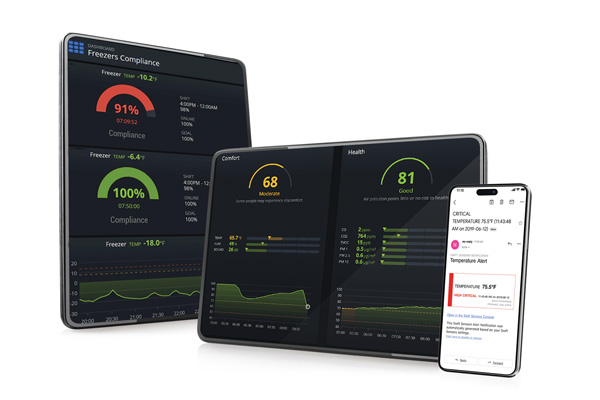
Features & Benefits
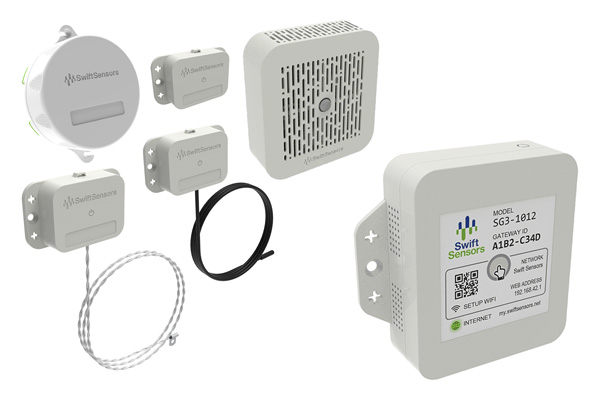
System Components
How Wireless Humidity Sensors Work
Swift Sensors is an easy-to-deploy, scalable monitoring and alerts solution driven by wireless smart sensors. Send instant alerts via email, SMS, or phone call for events that require immediate corrective action. Protect your business and your reputation from avoidable downtime, loss of assets, and preventable regulatory challenges.
Our Most Popular Humidity Monitoring Industries

Pharmaceutical Manufacturing
Wireless humidity monitoring offers continuous, real-time insights to help ensure critical moisture levels are maintained throughout the process.

Schools & Higher Education
Maintaining proper humidity levels in schools is essential for creating a healthy, comfortable, mold-free and safe learning environment.

Industrial Manufacturing
Remote humidity monitoring solutions help to maintain safe, controlled manufacturing levels for both storage and production areas.

Food Processing
Food processing facilities rely on wireless humidity monitoring to ensure product quality, regulatory compliance, and equipment longevity
Testimonials



Swift Sensors Humidity Sensor FAQs
What is a wireless humidity sensor?
A wireless humidity sensor is a device that measures the amount of moisture (humidity) in the air and transmits the data wirelessly to a central monitoring system or cloud dashboard.
At Swift Sensors, our wireless humidity sensors are designed for real-time monitoring and alerts in environments where humidity control is critical—such as restaurants, schools, medical labs, hospitals, and manufacturing facilities.
These sensors help you:
Prevent mold and mildew in food storage and HVAC systems
Ensure compliance with health and safety regulations
Protect sensitive equipment and materials from humidity-related damage
Track and analyze humidity trends remotely via mobile or desktop
Wireless humidity sensors are easy to install, require no wiring, and integrate seamlessly with our Swift Sensors Cloud-based Monitoring System.
How do wireless humidity sensors work?
Wireless humidity sensors work by detecting the amount of moisture in the air and transmitting that data wirelessly to a central monitoring platform.
Here’s how it works step-by-step:
Humidity Detection
The sensor uses a humidity-sensing element (typically capacitive or resistive) to measure the relative humidity in the environment.Digital Conversion
The sensor converts the analog humidity reading into a digital signal.Wireless Transmission
That data is then transmitted via a secure wireless protocol (Bluetooth Low Energy) to a Swift Sensors Gateway.Cloud Monitoring
The Gateway sends the data to the Swift Sensors Cloud Dashboard, where users can view humidity levels in real-time from any device.Alerts & Reports
If humidity levels go outside a preset range, the system can send instant alerts via SMS, email, or push notification. Users can also access historical data, graphs, and compliance reports.
This wireless system eliminates the need for manual readings, making it ideal for remote monitoring in food storage, healthcare, HVAC systems, and more.
What is the battery life of wireless humidity sensors?
The battery life of a wireless humidity sensor is dependent on several factors, including power efficiency of internal components, the type of communication technology utilized, how often the sensor communicates, and the environmental conditions where the sensor is placed.
Swift Sensors
Swift Sensors wireless humidity sensors are designed to maximize battery longevity. Swift Sensors utilize Bluetooth 5 (BLE5) to communicate, which is extremely energy efficient. Additionally, the communication frequency of each sensor can be managed to meet the specific requirements of each use case. Swift Sensors utilize two AAA lithium polymer batteries with an average lifespan of 6-8 years. Replacement batteries are readily available at hardware stores and various retail locations.
What is the range of a wireless humidity sensor?
The transmission range of a wireless humidity sensor is dependent on several factors, including the the type of communication technology utilized and the environmental conditions where the sensor is placed. Obstructions between the sensor and the device receiving the data such as industrial equipment and walls constructed of dense metal, concrete, brick, or thick wood can weaken or block sensor transmission.
Swift Sensors
The range for Swift Sensors wireless humidity sensors is approximately 300ft (150m) depending on the facility infrastructure and equipment located between the sensor and the gateway. The sensors use the Bluetooth 5 (BLE5) wireless communication protocol which allows signal transmission through doors and walls constructed of standard building materials.
Where are wireless humidity sensors commonly used?
Wireless humidity sensors are versatile and are widely adopted in commercial industries. They have become essential tools for monitoring equipment and environments where precise humidity monitoring is required for regulatory compliance and quality control.
Wireless humidity sensors are used across many industries, including:
Restaurants and Food Service
Medical Labs and Healthcare Facilities
Schools and Universities
Manufacturing and Industrial Plants
Warehousing and Cold Storage
Building and Facility Management
Data Centers and Server Rooms
Agriculture and Greenhouses
Museums and Archives
What are the benefits of using wireless humidity sensors?
Wireless temperature sensors provide a wide range of benefits that go beyond simple temperature tracking:
Efficiency & Safety – Minimize product loss and downtime.
Ease of installation – No need to run complex wiring, saving both time and labor costs.
Remote monitoring – Access real-time temperature data from any device (PC, tablet, or smartphone).
Custom alerts – Receive instant notifications if conditions exceed set thresholds, preventing product spoilage, equipment failure, or safety hazards.
Energy and cost savings – Optimize heating, cooling, and refrigeration systems to reduce energy consumption.
Scalability – Deploy one sensor or hundreds across multiple facilities, depending on your needs.
Regulatory compliance – Many industries (pharmaceuticals, food services) require accurate monitoring; wireless sensors simplify compliance reporting.
Can wireless humidity sensors send alerts?
Wireless humidity sensors are designed to measure and communicate data up to the cloud where the alerts are triggered.
Swift Sensors
Advanced platforms like the Swift Sensors Console, receive sensor data and convert the measurements into actionable analytics, reports, and alerts. Alerts can be sent to individuals or groups via SMS text, email, or voice to inform the right people at the right time in the most effective way.
How does the monitoring plan work?
The monitoring plan is very simple. The fee is based on the number of sensors you deploy. You can pay monthly, annually, or multi-year. There are no contracts required.
What is the Swift Sensors Console?
The Swift Sensors Console is a robust cloud-based monitoring, alerts, and reporting platform viewable remotely on any device. The Console is used for hardware setup and system configuration. The Console presents analytics that provide trend analysis, historical documentation, compliance reporting, and deep insights into equipment performance, facility operations, and environmental conditions. The platform is customizable and adaptable to any industry with unparalleled ability to search, filter, sort and view critical measurement and performance data. Configurable instant alerts enable immediate corrective actions when significant events occur. Alerts can be sent to individuals or groups via SMS text, email, or voice.
What about system security?
The Swift Sensors monitoring, alerts, and reporting platform was developed and is maintained by industry experts with extensive experience in network security. Sensor to gateway communication utilizes BLE5 and 128-bit AES encryption. Gateway to cloud Console communication utilizes ethernet, WiFi, or cellular (optional module) and 256-bit AES encryption. Data is securely transmitted over Secure Sockets Layer (SSL) on port 443. The Swift Sensor network does not allow any outside communication. As a result, the Swift Sensor network is incredibly secure.
Can I buy just the sensors?
Swift Sensors only communicate with Swift Sensors gateways. Swift Sensors gateways only communicate with the Swift Sensors Console. The Swift Sensor network does not allow any outside communication. As a result, the Swift Sensor network is incredibly secure. The Swift Sensor Console, however, features a robust API which can be utilized to communicate with 3rd-party applications.


